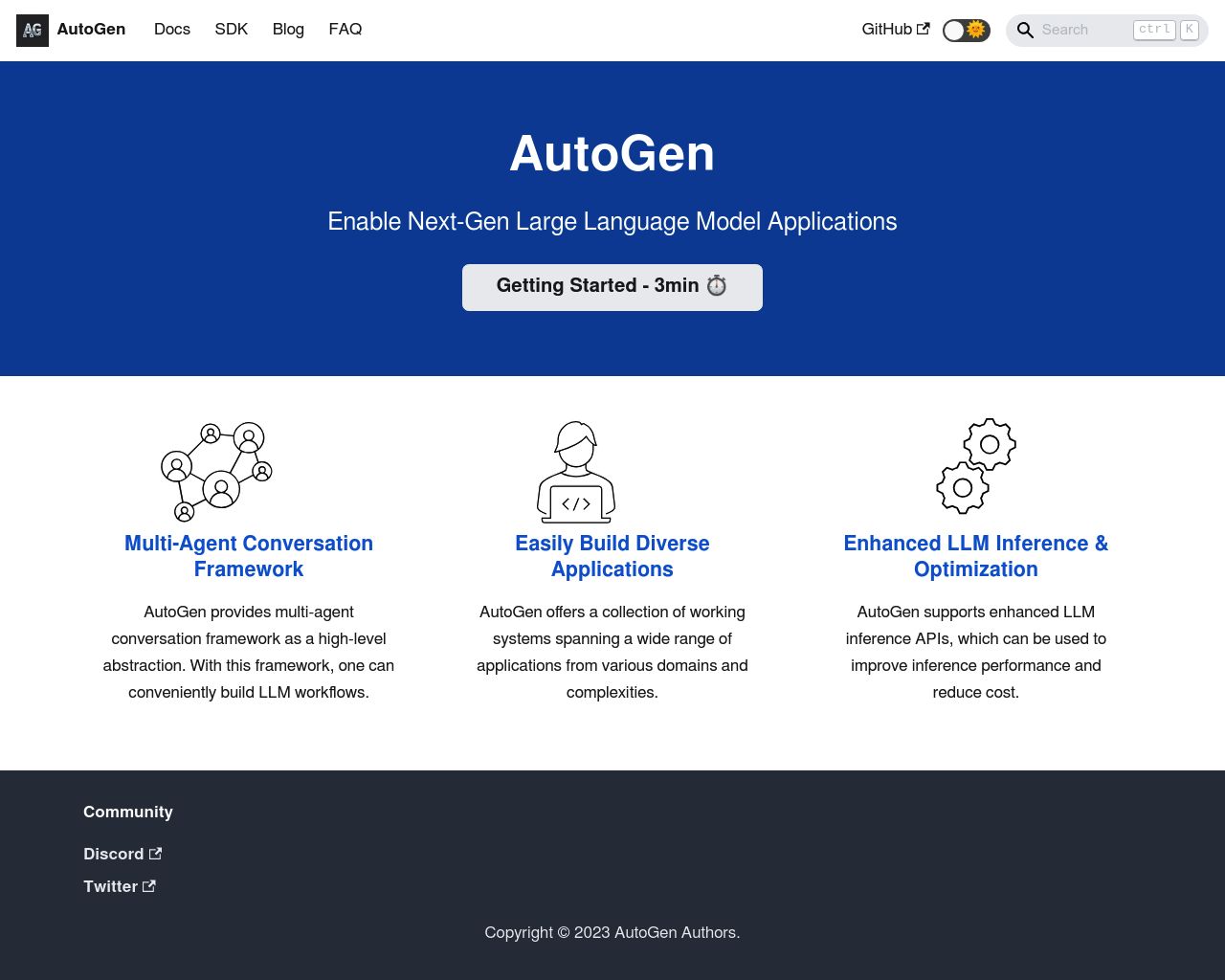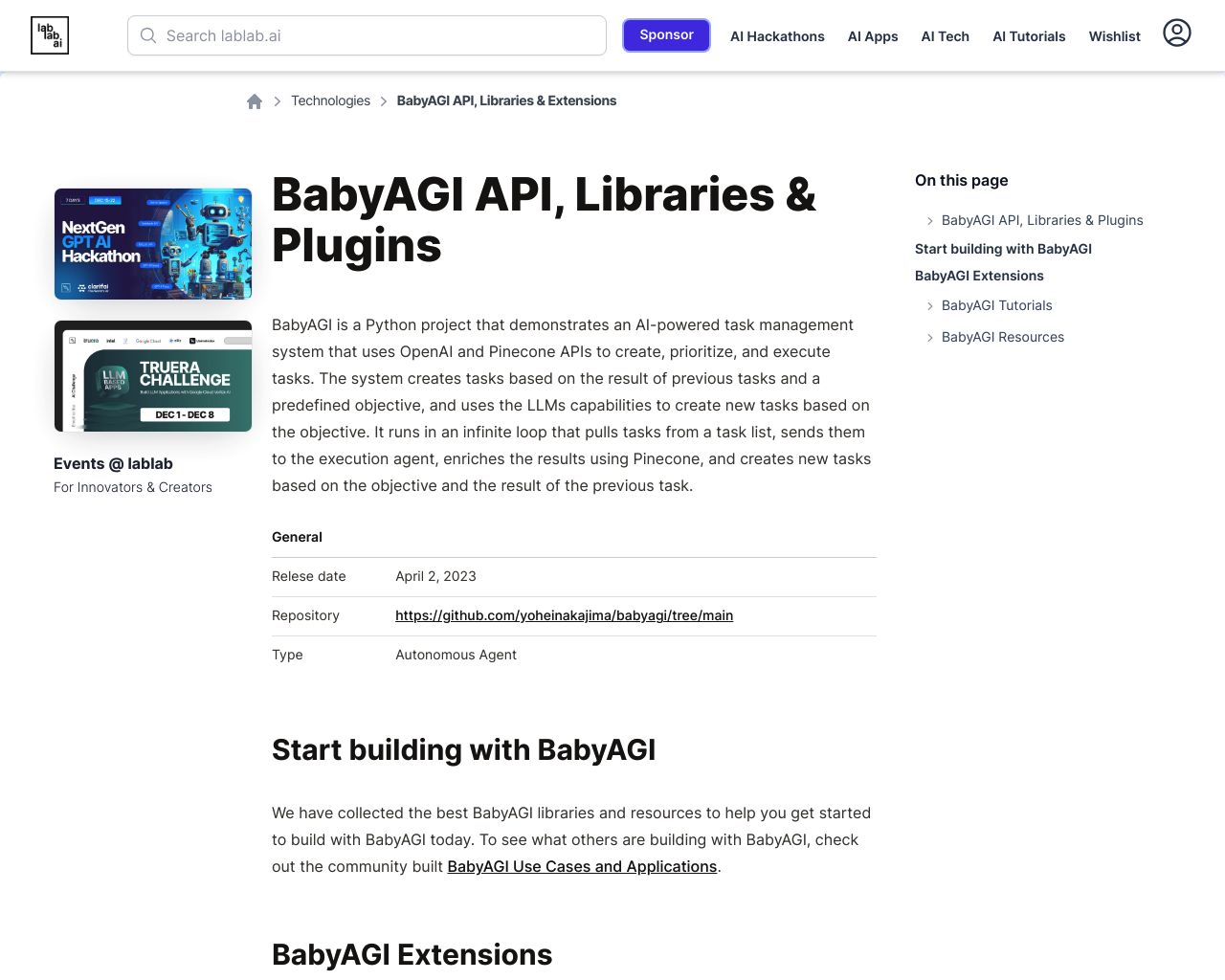AutoGen vs BabyAGI – A Detailed Comparison
AI agent development platforms empower organizations to harness cutting-edge artificial intelligence for complex problem-solving and task automation. AutoGen vs BabyAGI represent two innovative approaches in this rapidly evolving field. AutoGen excels in orchestrating multi-agent collaborations, while BabyAGI simulates human-like cognitive processes for dynamic task management.
This comparison explores the unique strengths, limitations, and potential applications of both platforms, highlighting key features that set them apart. We’ll also introduce SmythOS, a comprehensive alternative that combines powerful AI capabilities with user-friendly tools, robust security, and enterprise-grade features. Whether you’re a developer seeking advanced AI frameworks or a business leader exploring AI-driven solutions, this analysis will guide you through the landscape of modern AI agent platforms.
AutoGen Overview
AutoGen empowers developers to build sophisticated AI applications through multi-agent conversations. This open-source framework orchestrates interactions between customizable agents, Large Language Models (LLMs), tools, and humans to tackle complex tasks.


AutoGen’s core strength lies in its multi-agent collaboration system. Developers can create teams of AI agents that communicate, share knowledge, and work together to solve problems. This approach mirrors human teamwork, allowing for more nuanced and comprehensive problem-solving than single-agent systems.
AutoGen’s core strength lies in its multi-agent collaboration system… This approach mirrors human teamwork, allowing for more nuanced and comprehensive problem-solving than single-agent systems.
The framework optimizes LLM performance through advanced inference techniques. It incorporates tuning, caching, error handling, and templating to maximize the utility of powerful but resource-intensive models like GPT-4. This optimization ensures efficient use of computational resources while maintaining high-quality outputs.
AutoGen supports both autonomous operations and human-in-the-loop scenarios. This flexibility makes it suitable for a wide range of applications, from fully automated task solving to complex problems requiring human expertise. The framework’s adaptability extends to various domains, including code generation, task automation, and creative problem-solving in group chat environments.
While AutoGen offers powerful capabilities, it requires coding knowledge to set up and configure agents. This may present a barrier for non-technical users seeking to implement AI solutions. Additionally, the framework’s focus on code-based configurations means it lacks a visual builder or no-code editor, potentially limiting its accessibility to a broader audience.
BabyAGI Overview
BabyAGI revolutionizes task management by simulating human-like cognitive processes. This open-source project, developed by Yohei Nakajima, marks a significant step towards artificial general intelligence (AGI). BabyAGI excels at autonomously generating, prioritizing, and executing tasks, adapting to new challenges like a human would.


The platform’s core functionality lies in its dynamic task management system. BabyAGI creates and manages subtasks based on given objectives, continuously learning from previous results. It leverages advanced natural language processing from OpenAI and vector databases like Pinecone for efficient task result storage and retrieval.
BabyAGI creates and manages subtasks based on given objectives, continuously learning from previous results.
BabyAGI stands out with its task-driven autonomy and adaptability. The system performs complex problem-solving across various fields, from customer service to healthcare. In healthcare, it can analyze patient data and suggest personalized treatment plans. In education, it tailors learning experiences to individual student needs.
While BabyAGI offers powerful capabilities, it lacks some features found in more comprehensive platforms. It doesn’t provide a visual builder or no-code editor, which may limit accessibility for non-technical users. The absence of a dedicated agent work scheduler and deployment options like webhooks or site chat might restrict its versatility in certain business contexts.
Despite these limitations, BabyAGI’s approach to autonomous task management and human-like learning positions it as a valuable tool in the development of artificial general intelligence. Its ability to adapt, learn, and prioritize tasks autonomously makes it a compelling option for those seeking to push the boundaries of AI applications.
Feature Comparison
AutoGen and BabyAGI offer distinct approaches to AI agent development, with notable differences in their core components and security features. AutoGen excels in multi-agent collaboration, enabling teams of AI agents to work together on complex tasks. Its framework supports both autonomous operations and human-in-the-loop scenarios, making it adaptable for various applications. AutoGen also provides robust debugging tools and logging capabilities, enhancing transparency and auditability.
BabyAGI, on the other hand, focuses on simulating human-like cognitive processes for task management. It autonomously generates, prioritizes, and executes tasks, continuously learning from previous results. BabyAGI leverages advanced natural language processing and vector databases for efficient task result storage and retrieval. However, it lacks some of the comprehensive features found in AutoGen, such as multi-agent collaboration and extensive debugging tools.
In terms of security, AutoGen offers OAuth integration for API authentication, while BabyAGI’s security features are not explicitly detailed. Neither platform mentions specific data encryption capabilities or IP control features, which may be a concern for enterprises handling sensitive information. SmythOS addresses these gaps by providing robust security measures, including data encryption and IP control, alongside its intuitive visual builder and no-code options, making it a more comprehensive solution for businesses prioritizing both functionality and security in their AI development efforts.
Feature Comparison Table
| AutoGen | BabyAGI | SmythOS | |
|---|---|---|---|
| CORE FEATURES | |||
| Hosted Agents (Dev, Production) | ✅ | ❌ | ✅ |
| Environments (Dev, Production) | ✅ | ❌ | ✅ |
| Visual Builder | ❌ | ❌ | ✅ |
| No-Code Options | ❌ | ❌ | ✅ |
| Explainability & Transparency | ✅ | ❌ | ✅ |
| Human-AI Interaction | ✅ | ❌ | ✅ |
| Audit Logs for Analytics | ✅ | ❌ | ✅ |
| Agent Work Scheduler | ❌ | ❌ | ✅ |
| Logs & Monitoring | ✅ | ❌ | ✅ |
| SECURITY | |||
| Constrained Alignment | ❌ | ❌ | ✅ |
| IP Control | ❌ | ❌ | ✅ |
| COMPONENTS | |||
| Foundation AIs | ✅ | ❌ | ✅ |
| Data Lakes | ❌ | ❌ | ✅ |
| DEPLOYMENT OPTIONS (EMBODIMENTS) | |||
| Staging Domains | ❌ | ❌ | ✅ |
| Production Domains | ❌ | ❌ | ✅ |
| Deploy as Scheduled Agent | ❌ | ❌ | ✅ |
| DATA LAKE SUPPORT | |||
| Hosted Vector Database | ❌ | ✅ | ✅ |
| Sitemap Crawler | ❌ | ❌ | ✅ |
| YouTube Transcript Crawler | ❌ | ❌ | ✅ |
Best Alternative to AutoGen and BabyAGI
SmythOS stands out as a superior alternative to AutoGen and BabyAGI for AI agent development and deployment. Our platform offers a comprehensive suite of features that address the limitations of both competitors while providing unparalleled ease of use and versatility. SmythOS’s visual builder and no-code options democratize AI development, allowing users of all skill levels to create sophisticated agents without extensive programming knowledge. This accessibility, combined with our platform’s robust capabilities, sets SmythOS apart in the AI automation landscape.
SmythOS stands out as a superior alternative to AutoGen and BabyAGI for AI agent development and deployment… offering unparalleled ease of use and versatility.
Unlike AutoGen and BabyAGI, SmythOS provides a complete ecosystem for agent development, from creation to deployment and management. Our platform supports multiple environments, including development and production, ensuring seamless transitions from testing to live applications. SmythOS excels in offering a wide range of deployment options, including APIs, webhooks, scheduled agents, and integration with popular AI platforms. This flexibility allows users to implement AI solutions across various channels and use cases, surpassing the more limited deployment options of AutoGen and BabyAGI.
SmythOS’s feature set outshines both AutoGen and BabyAGI in critical areas such as security and scalability. We offer advanced data encryption, IP control, and OAuth integration, addressing enterprise-level security concerns that are not explicitly addressed by our competitors. Our platform’s scalability ensures that AI solutions can grow with your business needs, a crucial factor that sets SmythOS apart from both AutoGen and BabyAGI.
Our platform’s emphasis on explainability and transparency gives users unparalleled insight into their AI agents’ decision-making processes. This feature, combined with our comprehensive logging and monitoring capabilities, provides a level of control and understanding that surpasses both AutoGen and BabyAGI. SmythOS’s ability to facilitate multi-agent collaboration and human-AI interaction further cements its position as the superior choice for businesses looking to leverage AI technology effectively.
By choosing SmythOS, users gain access to a cutting-edge AI development platform that combines ease of use with powerful features, addressing the shortcomings of both AutoGen and BabyAGI. Our commitment to innovation and user empowerment makes SmythOS the ideal solution for businesses and developers seeking to harness the full potential of AI agents in their operations.
Conclusion
AutoGen and BabyAGI offer unique approaches to AI agent development, each with distinct strengths. AutoGen excels in multi-agent collaboration, enabling AI teams to tackle complex tasks with both autonomous and human-in-the-loop capabilities. BabyAGI focuses on simulating human-like cognitive processes, autonomously generating and managing tasks while continuously learning.
While both platforms demonstrate impressive capabilities, they have limitations. AutoGen requires coding knowledge, potentially limiting accessibility for non-technical users. BabyAGI, while innovative in task management, lacks some comprehensive features found in more robust platforms.
SmythOS emerges as a superior alternative, addressing the limitations of both AutoGen and BabyAGI. We offer a user-friendly visual builder and no-code options, making AI development accessible to a broader audience. Our platform provides robust security measures, including data encryption and IP control, crucial for businesses handling sensitive information. SmythOS also supports multi-agent collaboration, versatile deployment options, and extensive integrations, combining the strengths of AutoGen and BabyAGI while offering additional features.
To experience the full potential of AI agent development, create a free SmythOS account today. Our platform empowers you to build, deploy, and manage AI agents efficiently, revolutionizing your workflow and driving innovation across your organization. Explore our diverse range of AI-powered agent templates to jumpstart your projects and unlock new possibilities in AI automation.
Last updated:
Disclaimer: The information presented in this article is for general informational purposes only and is provided as is. While we strive to keep the content up-to-date and accurate, we make no representations or warranties of any kind, express or implied, about the completeness, accuracy, reliability, suitability, or availability of the information contained in this article.
Any reliance you place on such information is strictly at your own risk. We reserve the right to make additions, deletions, or modifications to the contents of this article at any time without prior notice.
In no event will we be liable for any loss or damage including without limitation, indirect or consequential loss or damage, or any loss or damage whatsoever arising from loss of data, profits, or any other loss not specified herein arising out of, or in connection with, the use of this article.
Despite our best efforts, this article may contain oversights, errors, or omissions. If you notice any inaccuracies or have concerns about the content, please report them through our content feedback form. Your input helps us maintain the quality and reliability of our information.
